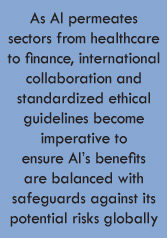AI has become integral across healthcare, finance, and content creation, profoundly transforming these industries. In healthcare, AI’s role in diagnostics is pivotal, accurately identifying diseases from medical imaging.
 For example, AI can detect early signs of breast cancer from mammograms, often surpassing human radiologists in accuracy. AI also revolutionizes personalized medicine by analyzing patient data to recommend tailored treatment plans. In finance, AI aids in fraud detection and risk management by analyzing transaction patterns to flag unusual activities indicating fraudulent behaviour.
For example, AI can detect early signs of breast cancer from mammograms, often surpassing human radiologists in accuracy. AI also revolutionizes personalized medicine by analyzing patient data to recommend tailored treatment plans. In finance, AI aids in fraud detection and risk management by analyzing transaction patterns to flag unusual activities indicating fraudulent behaviour.
AI-driven algorithms also optimize trading and investment strategies, enabling financial institutions to make swift, data-driven decisions.
Content creation has seen a surge in AI applications, facilitating the generation of written content like news articles or marketing copy through natural language processing. Platforms such as OpenAI’s GPT-3 create coherent, contextually relevant text, significantly expediting content production.
AI also enhances video and image editing, improving or generating visual content with minimal human intervention.
AI’s rapid global advancement has highlighted ethical, privacy, and security concerns that transcend borders. Ethically, AI usage raises questions about accountability and transparency, especially when autonomous AI systems make decisions affecting individuals.
Privacy concerns
For instance, AI-driven recruitment tools might inadvertently perpetuate biases from historical data, disadvantaging specific demographic groups in hiring processes. Privacy concerns arise due to the vast personal data AI systems collect and analyze, posing risks such as unauthorized data breaches where AI mishandles sensitive information. Moreover, AI-powered cyber-attacks pose formidable security threats, capable of breaching robust security measures.
Globally, regulatory frameworks struggle to keep pace with AI’s rapid evolution, resulting in gaps in addressing these concerns effectively. The General Data Protection Regulation (GDPR) in Europe exemplifies an attempt to regulate AI’s privacy impact, mandating explicit consent for data use and transparent explanations of AI-driven decisions. However, many countries lack comprehensive laws tailored to AI, leaving significant ethical and privacy issues unaddressed.
Global disparities in AI technology accessibility and affordability exacerbate discrepancies in regulatory oversight and technological capabilities. Developing regions often lack the infrastructure and resources for robust AI governance, heightening risks of data misuse and ethical breaches.
As AI permeates sectors from healthcare to finance, international collaboration and standardized ethical guidelines become imperative to ensure AI’s benefits are balanced with safeguards against its potential risks globally.
The advancement of AI, particularly in countries like China, has catalyzed technological progress across developing nations, setting precedents in AI research, development, and infrastructure investment.
China’s initiatives in AI have enhanced efficiency, productivity, and service delivery in sectors such as healthcare, agriculture, and manufacturing, serving as a model for other developing nations aspiring to leverage AI for economic and social development.
China’s investments in AI education and talent cultivation contribute to building a skilled workforce capable of driving global technological innovation.
Reshaping of traditional roles
As developing countries embrace AI technologies pioneered by nations like China, they position themselves toward technological parity and competitiveness globally. Professionals across healthcare, finance, and content creation must adapt to AI’s transformative impact, integrating AI tools to enhance their expertise and workflows. This shift necessitates ongoing learning and adaptation as AI reshapes traditional roles and introduces new dynamics in professional environments.
Despite AI’s benefits, significant ethical, privacy, and security concerns persist across all fields, exacerbated by inadequate regulatory frameworks, particularly in developing countries like Sri Lanka. The lack of comprehensive laws addressing AI’s impact can lead to data misuse, biased algorithms, and privacy infringements. Moreover, global disparities in regulatory frameworks hinder uniform AI governance, complicating efforts to address ethical, privacy, and security risks effectively.
The widespread adoption of AI across healthcare, finance, and content creation heralds transformative advancements globally. AI’s ability to enhance diagnostic accuracy, streamline financial operations, and expedite content production underscores its profound impact on modern industries.
However, alongside these benefits come profound ethical, privacy, and security challenges demanding urgent attention. Robust regulatory frameworks and international cooperation are essential to ensure responsible AI deployment, maximizing benefits while safeguarding societal interests.
AI’s rapid evolution in Asia and the Pacific is driven by strategic government initiatives, private sector investments, and robust innovation ecosystems. Leading countries like China, Japan, and Singapore leverage AI to bolster economic growth and societal development, supported by substantial investments and infrastructure. Despite these strides, disparities in regulatory frameworks and technological capabilities persist, particularly in developing regions like Sri Lanka. Addressing these challenges requires inclusive AI governance and global ethical standards to harness AI’s potential while mitigating associated risks effectively.









